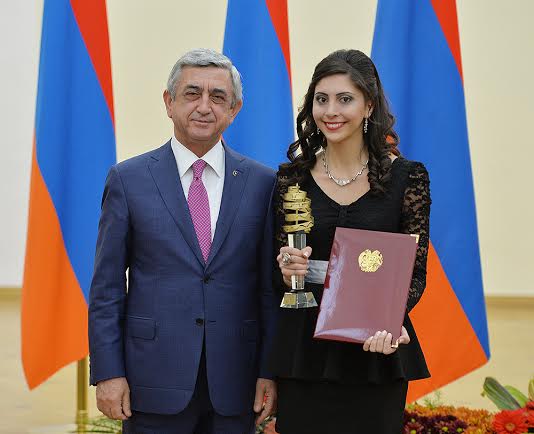
“The war in Syria disrupted my life, but AUA is giving me a better future,” Syrian Armenian Gasia Atashian Says
4 min readYEREVAN, Armenia – It is tragic to lose one’s home and to have one’s dreams and aspirations cut short. This is what fate had in store for 20-year-old Syrian Armenian Gasia Atashian, an undergraduate student at the American University of Armenia (AUA). But this was her fate only up to December 2013, when Atashian and most of her family escaped their war-torn hometown of Aleppo, Syria, for a safe haven in Armenia.
When the Syrian war reached Aleppo in 2011, Atashian was in class with other 11th graders. “There was a rumble. Later, we learned that it was a bomb,” Atashian recounts. Since that day, the situation in Aleppo has grown progressively worse. “Bombs were falling. There was no water, no internet, and no electricity. Going to school was dangerous because there were snipers. In 12th grade, I decided to study information technologies (IT) and worked hard to get into university. I studied by candlelight,” Atashian continues. Despite the dangers and challenges, she was accepted into a selective technical university in Aleppo, which was no easy feat for a young Syrian Armenian woman living in an Arab Muslim, male-dominated society. Her dream had come true, but she could not fully savor her accomplishment. She attended university just one week, before she had to stop going. “My family decided that we would leave Aleppo. Staying might have cost us our lives,” she says.
Atashian had been in Armenia only once before, as part of a ten-day trip with her scouts troop in 2010. She was feeling uneasy and sad about the move. “I was sad because I had gotten accepted into my desired university, but had to abandon my studies; I was worried, as I didn’t know what I would do in Armenia; I might not be able to continue my education. I didn’t know anything about Armenia’s universities and didn’t understand how I could get accepted,” she says.
The family made their way to the homeland by way of Beirut, Lebanon; the airport in Aleppo was closed due to the threat of bombardments. Once she reached Yerevan, she found out that AUA has an IT department and immediately threw herself into preparing for the University’s admission exams: she studied hard for the TOEFL exam for English language competency—an especially challenging proposition since her schooling in Syria had been in Arabic. She passed the test and was accepted into AUA, leaving the admissions committee in awe of her accomplishment.
Atashian aspired for more than just this achievement and pushed herself towards making even greater strides towards a better future. Her already impressive academic and extracurricular accomplishments, including high grades, basketball training for almost ten years, participation in scouts activities, and even a certificate for the video-archiving of Genocide-related photos, contributed towards other important developments.
Among them, remarkably, was the highly competitive Best Diasporan Student Educational Award of the President of the Republic of Armenia in the Sphere of IT (Category II), which Atashian won in 2015. For the 2015-16 academic year, she was also awarded AUA’s Kablanian scholarship, which is a full, merit-based scholarship given to a Syrian Armenian student to cover his or her tuition fees. Atashian has also received the Munushian scholarship for Syrian Armenian students during the 2014-2015 academic year.
As Atashian studied hard and excelled at AUA, normalcy slowly returned to her family as her sister, too, who was set on going to medical school, was admitted to Yerevan State Medical University and showed excellent results there. By then, her father, who had stayed behind in Aleppo, had finally given up hope that peace might be restored in Syria and joined his family in Armenia.
And things kept getting better and better. “AUA surpassed my expectations of the level of education that it offers. It’s the best university in Armenia. The professors are very good. They make you work hard and help you further your interest in the field you’re studying. They force you to do your best. That’s what I like the most,” Atashian says.
Studying at AUA has allowed Atashian to have a new kind of life. “I don’t just come to study at AUA. We have extracurricular activities; we are offered general education courses; there are volunteering opportunities. In this way, we get exposed to other fields. Our education is not limited to just our specialization. It’s very cool. I like that very much,” Atashian says.
“I feel I belong at AUA. I feel we are one family,” Atashian continues. “It was different in Syria. I was the only Syrian Armenian girl in my university and needed time to adapt to the new environment, after having graduated from an Armenian private school in Aleppo.”
As Atashian looks forward to even greater accomplishments in the IT field, she feels pride and contentment in her current situation. “I’m so happy and proud to be on this incredible path towards success. The war in Syria disrupted my life; but AUA is giving me a better and brighter future.”
Founded in 1991, the American University of Armenia (AUA) is a private, independent university located in Yerevan, Armenia and affiliated with the University of California. AUA provides US-style education in Armenia and the region, offering high-quality, graduate and undergraduate studies, encouraging civic engagement, and promoting public service and democratic values.
Gasia Atashian, who escaped the war in Syria in 2013, excels academically as a sophomore in AUA’s Department of Computational Sciences. She is shown here posing with President of the Republic of Armenia Serzh Sargsyan who awarded her with a highly competitive prize for her educational accomplishments in IT.
